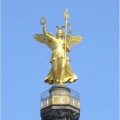Part 1
Last night, I arrived in a Calgary under siege. I'm here to help host a press conference today on an issue directly related to the barriers in the street and likely violence this city will suffer. An hour's drive from Calgary, in one of the most beautiful spots on the planet, the world's richest and most powerful will soon begin discussions on how to help the world's poorest and most dispossessed. Meanwhile, ugly street battles will erupt between police and violent thugs here and in Ottawa. These hooligans will claim they are throwing rocks, attacking innocent people and vandalizing property to help the world's poor. Neither the world leaders nor the street vandals - who, with Orwellian flair, will claim they are fighting for democracy by violently attacking a meeting of democratically-elected leaders - will do much to help the world's poor. This new sort of "white man's burden" - the idea that evil European capitalism is responsible for the troubles of poor nations and thus must save these nations - lets corrupt regimes off the hook for crimes against their people. It provides them with foreign aid they will use to crush opposition, reward crony-elites, and protect their power.
Foreign aid is not the answer. Over 50 years of overwhelming, fact-based evidence shows that nations are in charge of their own fate, no matter how poor and dismal their starting point. That's also the lesson from the sixth Economic Freedom of the World: Annual Report 2002, to be released today. The first report, published in 1996, was the result of a decade long research project, led by Fraser Institute Executive Director Michael Walker and Nobel Laureate Milton Friedman, involving over 100 of the world's top scholars. Nations with economic freedom prosper; those without, fail. In the 1950s, Hong Kong, Singapore, South Korea and Taiwan were poorer than many African nations. The military situation was every bit as dire as it now in much of Africa. Unlike African nations, none of these Asian backwaters enjoyed natural resource wealth. Nor, compared to African nations, did they receive much foreign aid. All had recently suffered foreign occupation and colonialism. All freed up their economies. Now, they enjoy first world standards of living, and the two nations states, South Korea and Taiwan, have full-bodied democracy and freedom.

